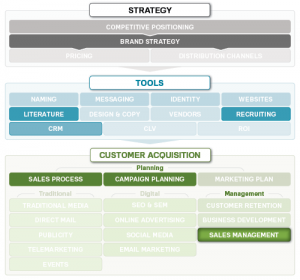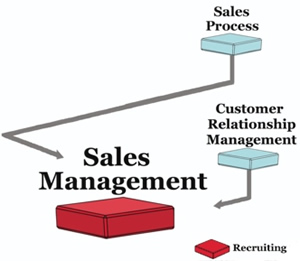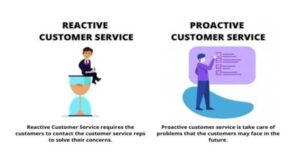

Creating a sales management strategy is one of the easiest ways to increase your revenue and profitability.
Sales management is about leading the people and process your company uses to sell to prospects and convert them into customers. Responsibilities include:
- Building the right sales strategy
- Hiring the right team
- Creating the right compensation plans, territories and quotas
- Setting the right projections
- Motivating your team
- Tracking revenue against goals
- Resolving conflicts
- Training and coaching sales reps
- Managing processes
- Getting the sale!

Sales Management Strategy
Why is there a sales management strategy chapter in a marketing process article?
- Sales and marketing serve one purpose: to generate revenue. They should be completely aligned in their understanding of customer needs, their messages, and in the process they use to identify, sell, close and manage prospects and customers. They should work together as a unit, providing valuable feedback to each other to improve all of their strategies.
- If you’re B2B, your sales team is the voice of your company. In fact, your reps may be the only people with direct customer interaction. They may be responsible for prospecting, selling and managing existing customers. They control the dialogue with your market, gather feedback, and deliver on your value proposition and brand promise.
- The sales team will make or break your marketing efforts. Even if you’re not personally responsible for the sales team, it’s important to understand their role and draw on that knowledge to create better marketing programs.
- When departments aren’t aligned, your company wastes time and opportunity. For example, when salespeople rewrite literature and tools to their liking, your messages are diluted and salespeople are doing something other than selling.
Small improvements in your team’s skills and processes can often produce substantial results. Even great salespeople can benefit from a good sales management strategy and coaching; if your team is struggling, there’s room for improvement. And with the right attention to your pipeline and goals, you can make sure you’re on track to hit your numbers and make adjustments as needed.
| Best Case | Neutral Case | Worst Case |
|---|---|---|
| Your sales team is a revenue machine. They have the right skills and experience; they’re motivated to come in each day and close business.You coach them regularly to improve their performance. When problems arise, they’re dealt with swiftly.
The sales team does a great job delivering the company’s value proposition, brand strategy and messages. |
There are strong and weak players on the sales team.Some require a lot more hand-holding than you’d like; there isn’t always time to give them the help they need. As a result, their close ratios are much lower.
They’re probably not hitting their quotas, but they’re not a major liability to the company. |
Your sales team isn’t strong. They may not have a dedicated sales manager to help improve performance.They may not have enough experience, especially if you’re a small company that can’t yet afford the big hitters.
You have a pipeline but don’t know what’s happening with prospects; it takes longer than it should to close deals. You suspect you need an entirely new sales operation. |
Sales Management Strategy Concepts & Steps
Before you begin
Your sales team should support your positioning and brand strategy, contributing to the experience that you wish to deliver and the mind share that you wish to own.
This is accomplished by good hiring, training and strong sales management strategy. Have your team represent the personality traits of your brand, and look to hire people that fit them well.
Create the right compensation plan and tie it to your revenue goals
Great salespeople want to make money. Tie the plan to your revenue goals and make sure that you’re compensating your reps for the right things. For example, if your reps don’t earn commission for managing “house” accounts, they’ll spend their time going after new business and you could lose valuable existing customers.
Set realistic quotas
Be realistic about what a salesperson can accomplish in a set timeframe. Good salespeople can be demotivated by unrealistic quotas, which can lead to turnover.
Hire the right people

To build a great team, start with a strong recruiting effort. Create a detailed job description so you know exactly what you need in your candidates. Cast a wide net, use a thorough interview process, and go after the candidates you really want.
Coach and provide feedback

A good manager actively works with the sales team. Train your reps thoroughly and coach them to improve their skills. Go on calls, establish performance measurements, and provide feedback. If a rep has trouble in a particular area, create an action plan and measure improvement.
Generate good reports

You’ll need good sales reports to measure team and individual progress. Yet you don’t want your sales reps to spend valuable sales time creating manual lists and reports. Instead, develop automated reporting processes – for example, create reports in your CRM system. With good reports, you can see problems much earlier and take action more quickly.
Motivate!
Good sales reps want to get better – encourage them to read, attend seminars, network, and keep refining their skills.
After Implementing Your Sales Management Strategy
Keep working with your team, improving their skills, and adjusting as needed. Hire the right people, manage them well, and enjoy their success!For hands-on guidance on managing your sales team, again, review your sales management processes.
What do you think about your dales management strategy? Is your strategic plan helping you expand your reach and grow revenue? If you would like to comment on this article or learn more about my consulting project management work, please visit me at my personal website

10 Crilly Management Consulting Case Studies
Please, share your thoughts in the comment area below.








